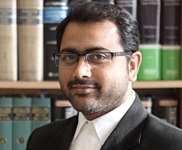Regulatory
 As the Indian food safety regulator has just announced that it would finally draft new norms for maximum lead and other heavy-metal content in foods, Advocate Kunal Kishore explains why food regulation has been neglected for far too long.
As the Indian food safety regulator has just announced that it would finally draft new norms for maximum lead and other heavy-metal content in foods, Advocate Kunal Kishore explains why food regulation has been neglected for far too long.
Regulatory
 There’s a crisis in the packaged food market after Hindustan Unilever Ltd followed Nestle India Ltd in pulling its instant noodles off the shelves. Tata Starbucks Ltd, too, has withdrawn some of its products.
There’s a crisis in the packaged food market after Hindustan Unilever Ltd followed Nestle India Ltd in pulling its instant noodles off the shelves. Tata Starbucks Ltd, too, has withdrawn some of its products.
Regulatory
 Delhi high court advocate Sudipto Sircar argues that the Competition Commission of India’s (CCI) surprisingly deficient market research before approving the Jet-Etihad combination on 11 December, has put an otherwise desirable investment into jeopardy by exposing the combination to inevitable litigation.
Delhi high court advocate Sudipto Sircar argues that the Competition Commission of India’s (CCI) surprisingly deficient market research before approving the Jet-Etihad combination on 11 December, has put an otherwise desirable investment into jeopardy by exposing the combination to inevitable litigation.
Regulatory
The Reserve Bank of India proposed in a statement yesterday that it would allow foreign banks’ wholly owned subsidiaries to open branches anywhere in India as local banks have been allowed to do. Most foreign banks in India operate as branches as not wholly-owned subsidiaries at the moment, reported Reuters. Foreign-owned subsidiaries would have to have a capital of at least Rs 500 crore ($80 million) and capital adequacy ratios of at least 10 per cent under the proposal.
Southeast Asia’s largest bank DBS would be willing to expand under the new rules immediately, reported Bloomberg, though banks were cautious commenting to media until they could examine the new rules in detail. The conversion would place the foreign banks under additional regulatory oversight, with the RBI suggesting that around 12 foreign banks were “systemically important” enough – i.e., large enough – to be compulsorily required convert to the new structure, reported Mint.
Regulatory
 J Sagar Associates (JSA) advised Adani Power, part of the Adani business conglomerate, which obtained a favourable ruling from the power sector regulator Central Electricity Regulatory Commission (CERC).
J Sagar Associates (JSA) advised Adani Power, part of the Adani business conglomerate, which obtained a favourable ruling from the power sector regulator Central Electricity Regulatory Commission (CERC).
Regulatory
The American Bar Association (ABA) has ruled that foreign qualified lawyers may work as in-house lawyers in all 50 US states with limited authority.
In India in-house lawyers have to surrender state bar council registrations, meaning they can effectively work without oversight of the legal regulator. Some foreign-qualified lawyers therefore also work within companies' legal teams in India, although non-Indian lawyers are not permitted to practice in law firms or courts.
Until the ABA’s vote last week, foreign lawyers were barred from practising in-house in all but seven states. Although that rule has now been lifted, foreign qualified in-house lawyers will not be allowed to advise on US law without consulting an authorised US attorney.
The rule change was affected by Resolution 107A and 107B, two among several other resolutions passed by the ABA’s 560-member house of delegates in its mid-year meeting.
The new policy was motivated by the growing presence of multinational companies in the US, which, the ABA stressed, already had foreign lawyers practicing in the US albeit with little oversight. Authorising their registration will help to regulate them better, reasoned the body. [Law Gazette UK/Bizjournals]
Opponents argued that the resolution could pave the way for legal malpractice. Yale law school lecturer and former ABA standing committee chair Larry Fox said:
Foreign lawyers, for example, could file tax returns improperly, mishandle contracts and misunderstand domestic regulations.
Even the lawyers who have a good education engage in malpractice every day. Why should we add to the malpractice by adding to our profession people who by definition don't have an education in these matters? [Reuters]
Regulatory
The Telecom Disputes Settlement and Appellate Authority (TDSAT) is now practically defunct, after the body’s only serving member PK Rastogi retired, as predicted in a column on Legally India in January. According to an Economic Times’ telecommunications ministry source, the appointment process for one of two members, former MTNL managing director Kuldeep Singh, has begun.
The tribunal has not had a chairman since former Supreme Court (SC) judge SB Sinha retired from the chair in November 2012. Former SC judge Cyriac Joseph, who was reportedly appointed to take the chair after Sinha, has not joined to date.
According to ET, the process of appointment was underway and the members will be announced before the month-end, although it another source told the paper that the Chief Justice of India (CJI), who takes a call on chairmans' appointments, had not yet recommended names for the position. [ET]
Regulatory
PK Malhotra – the last of the two present members in the Securities Appellate Tribunal (SAT), and currently presiding over the body – was appointed as secretary of the legislative department. The other member – SSN Moorthy – is set to retire this month. [PTI]
The tribunal has had no presiding officer since ex-chairman justice Nauvdeep Kumar Sodhi’s retirement in December last year. Malhotra had been officiating as presiding officer since then.
The lack of a presiding officer had cast ambiguity over the validity of the previous year’s decisions of the SAT. [The Firm, Money Control]
Regulatory
The Telecom Disputes Settlement and Appellate Tribunal (TDSAT) got a new chairman in former Supreme Court judge Cyriac Joseph. Joseph who retired from the SC on 27 January after three-and-a-half years on the roster, succeeds former SC judge SB Sinha at the chair after Sinha’s retirement last month.
He is a former chief justice of Uttaranchal high court as well as Karnataka high court.
Joseph enrolled at the bar in 1968, became the senior government pleader in Kerala high court in 1979 until 1987, was Additional Advocate General in Kerala for three years from 1991, and was appointed as a permanent judge of Kerala high court for a month in 1994.
He was transferred to Delhi high court that year, and was appointed as Uttaranchal high court’s chief justice in March 2005. Next year he became chief justice of Karnataka high court. [Indian Television]
Sinha was appointed as chairman in September 2009, succeeding former SC judge Arun Kumar.
Regulatory
 Breaking: The Bangalore-based Centre for Internet and Society (CIS) has carried out an undercover investigation into the “chilling effects” of new information technology laws on freedom of expression online, with six out of seven major websites removing innocent content online without proper investigation, creating a “private censorship regime”.
Breaking: The Bangalore-based Centre for Internet and Society (CIS) has carried out an undercover investigation into the “chilling effects” of new information technology laws on freedom of expression online, with six out of seven major websites removing innocent content online without proper investigation, creating a “private censorship regime”.
Regulatory
 The notification of the Information Technology Rules 2011 in April 2011 include new privacy and online publishing regulations, which could pose significant roadblocks for business operations with restrictive handling of personal data and information and introduction of stringent guidelines for intermediaries and cyber cafes.
The notification of the Information Technology Rules 2011 in April 2011 include new privacy and online publishing regulations, which could pose significant roadblocks for business operations with restrictive handling of personal data and information and introduction of stringent guidelines for intermediaries and cyber cafes.
Regulatory
Exclusive: The Bar Council of India (BCI) has requested comments on the new draft code of ethics for advocates, which introduces rules on conflicts of interests, bans conditional fee arrangements (CFAs) and continues to restrict advertising and business interests of lawyers.
Regulatory
 Trilegal co-founding partner Rahul Matthan has drafted a proposal for the department of personnel training a create an Indian privacy and data protection law that would regulate the storage and disclosure of personal information.
Trilegal co-founding partner Rahul Matthan has drafted a proposal for the department of personnel training a create an Indian privacy and data protection law that would regulate the storage and disclosure of personal information.
Regulatory The Competition Commission of India (CCI) has gone to the Supreme Court to curtail the powers of its own appellate tribunal in the case of SAIL v Jindal Steel, with senior advocates, Economic Laws Practice and Amarchand Mangaldas representing the parties.